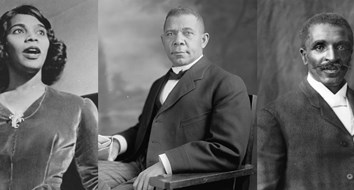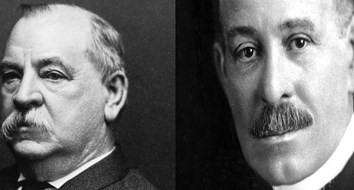Lawrence W. Reed, economist and author, is President of the Mackinac Center for Public Policy, a free market research and educational organization headquartered in Midland, Michigan.
Years ago as a college professor of economics, I posed a question to each crop of freshman students on or about the first day of class. “Can anyone tell me,” I asked, “what determines whether society is organized along socialist, centrally planned lines or as a free enterprise, private property order?” The answer to that query, I suggested, would be the same as the answer to this corollary question: “What causes societies occasionally to change from one economic system to the other?”
Rarely would I elicit the response I was looking for, in spite of all the hints I gave. The students' answers included the following: “the President,” “the Congress,” “the news media,” “the unions,” “the schools.” Invariably, someone would suggest there was no determinant at all, that we were talking about mere random events—a kind of irrational and unexplainable ebb and flow of history.
At some point, the guesswork would come to an end and I would reveal the answer I was seeking. “People or the institutions they establish play important roles, but neither one is fundamental enough because neither one explains why people behave the way they do. The correct answer is that which the French author Victor Hugo once said was more powerful than all the armies of the world: IDEAS![1]
People such as politicians, activists, clerics, and teachers can often be agents of change, but ideas are the instigators. In shaping public policy that includes the larger question of free enterprise or socialism, democracy or dictatorship, ideas are of decisive importance. What people believe says a great deal (maybe everything) about how they behave, for whom they vote, what laws and rules they embrace, what kind of system they'll work to achieve. Change ideas, and you can change the course of history.
Ideas—both good and bad—can, indeed, be quite intoxicating. They evoke strong passions and spark revolutions. In this century, we witnessed first the rise of a world empire committed to the ideas of Karl Marx, followed by its dissolution and demise at the “hands” of a more powerful idea, that of freedom and free markets.
The British economist John Maynard Keynes put it well when he wrote, “The ideas of economists and political philosophers, both when they are right and when they are wrong, are more powerful than is commonly understood. Indeed, the world is ruled by little else. Practical men, who believe themselves to be quite exempt from any intellectual influences, are usually the slaves of some defunct economist. Madmen in authority, who hear voices in the air, are distilling their frenzy from some academic scribbler of a few years back.”[2]
It will come as no surprise to many in the business world that anti-capitalistic ideas have had a dramatic impact in this century. A public sector that imposes more regulations than ever on the private sector and consumes at least five times the share of national income it consumed in 1990 is stark evidence of those ideas.
Another disturbing bit of evidence came from a study a few years ago of network television in America: only 3 percent of business people depicted on television, the Media Institute found, were involved in “socially useful or economically productive” behavior.
The same study reported that more than half of all corporate chiefs on TV committed illegal acts ranging from fraud to murder. And a special PBS program entitled “Hollywood's Favorite Heavy: Businessmen on Prime-Time TV,” declared, “By the age of 18, the average kid has seen businessmen on TV attempt over 10,000 murders.”
Make no mistake about it, these developments reflect (and even nourish) a body of opinion, a complex of ideas, which at their root are inimical to free markets and private enterprise. They speak volumes about a void in our national economic education. And in a subtle but corrosive way they have been undermining the philosophical and institutional pillars of our free society for decades. “Ideas,” Richard Weaver once said, “have consequences.”
Because the war of ideas is so important, American business simply cannot afford to be a conscientious objector. If whether you live in a socialized economy or a free one matters to you (and it absolutely does, even if you choose not to think about such things), then failure to commit time and resources to help shape the climate of opinion around you is shortsighted and probably suicidal.
Many business executives may be quick to say, “But I am involved in such things. I give money to candidates, and so do the political action committees to which my company contributes.” That may be important, but it's also akin to locking the proverbial door after the horse has already left the barn. Politicians usually reflect opinion and seldom generate it; what they can accomplish in office is defined and circumscribed by prevailing majority opinion. If you really want to make a difference and get the maximum bang for your buck, then you should invest in ideas. Change public opinion and the politicians will fall into line accordingly.
Business funding of public policy research (or similar so-called “advocacy” groups) is not new. What comes as a surprise to many people is the fact that a sizeable chunk of those dollars has gone (and still goes) not to “free market” groups but to those of a very different bent. Too many people in business are funding the wrong side.
In a recent edition of Patterns of Corporate Philanthropy (published by the highly regarded Capital Research Center in Washington, D.C.), economist James T. Bennett documented what he regards as the sad state of corporate America's support for the very system which forms the foundation of their existence, free enterprise. Bennett says that year after year, the overwhelming share of corporate donations for public affairs research groups went to those of an anti-free enterprise persuasion (61.3 percent, by his calculations).
In his introduction to the first edition of Patterns, Robert H. Malott of the FMC Corporation wrote, “Unfortunately, most corporations devote only a very small share of their contributions to public affairs. Worse yet, even these relatively small contributions often reflect a strategy of appeasement. Put more bluntly, many corporations actually reward the groups that most vigorously attack them.”
Business support of groups and people who advocate an ever more intrusive role in the economy for government amounts to nothing more than feeding the alligator in the hope that he'll eat you last. As a stockholder, I feel betrayed when I see that happen. As a believer in the much bigger picture, the importance of a free society, I am outraged by it.
American business needs to take a hard look at where its public affairs dollars are going and ponder the question, “Are we helping to preserve and strengthen private property, free enterprise, and individual initiative, or are we slitting our own economic throats by subsidizing groups that push for more centralized planning and control?”
Anyone in business who suffers from the illusion that ideas are too intangible to matter ought to wake up and smell the coffee. Ideas make all the difference in the world because they create the stage on which all of us perform.
Investing in ideas—the right ones, not just any ideas—is a long-term investment, but one which has a return every bit as tangible as the purchase of stock. The first priority for each individual business person is the same as that for anyone else who values freedom: educate yourself! Become as effective for freedom in both word and deed as you possibly can. Then, if your material means allow, consider investing in those groups committed to the free market, such as The Foundation for Economic Education. The return on that investment a stronger, free society—is the one yield that won't raise your tax bill and will go a long way to assure that your children live as free and prosperous citizens.
- Histoire d'un Crime, Conclusion: La Chute (1877). Hugo's original, “On résiste à l'invasion des armées, on ne résiste pas à l'invasion des idées,” has been translated and popularly paraphrased as: “More powerful than all the armies in the world is an idea whose time has come.”
- John Maynard Keynes, The General Theory of Employment, Interest, and Money (1936), chapter xxiv.





